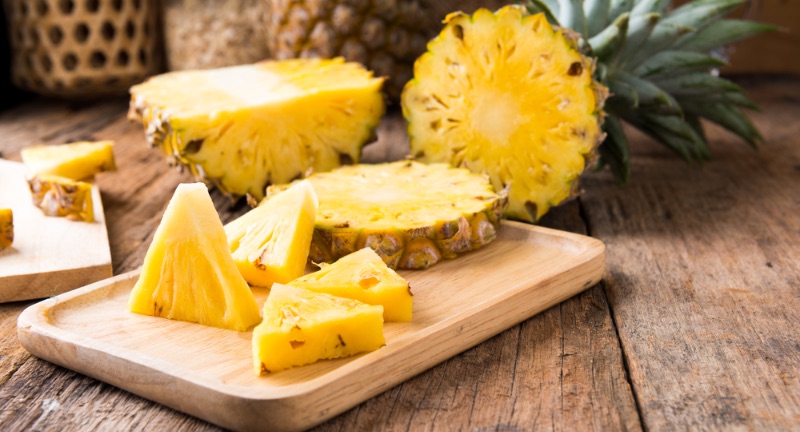FOOD
Why Pineapple May Just Be Perfect On Pizza
Published
2 weeks agoon

Shutterstock
Pineapple is a fruit that’s just as sweet as it is tough on the outside. It’s the tropical food that’s always ready to brighten up your day, no matter how “prickly” things get. Whether you’re adding it to your smoothie, tossing it on your pizza (yes, we said it!), or just eating it straight up, pineapple is here to keep your taste buds on their toes. So, grab a slice, take a bite, and let the pineapple party begin!
Delicious taste

Shutterstock
Pineapple offers a burst of tropical flavor that immediately transports you to a sun-soaked beach. Its perfect balance of sweetness and tang makes it a delightful treat for any occasion. Whether fresh, canned, or juiced, it brings a natural sweetness that satisfies the taste buds. Pineapple’s rich, juicy texture makes every bite a refreshing experience that keeps you coming back for more.
Rich in vitamins

Shutterstock
Pineapple is packed with essential vitamins, most notably vitamin C, which plays a crucial role in boosting your immune system. It also provides vitamin A, B6, and folate, all of which contribute to overall health and well-being. These vitamins help maintain your skin’s radiance, promote healthy red blood cells, and even support your nervous system. Consuming pineapple regularly helps ensure you meet your daily vitamin needs in a natural and tasty way.
Boosts digestion

Shutterstock
Pineapple is an excellent source of bromelain, an enzyme known for its ability to improve digestion. Bromelain helps break down proteins, aiding your stomach in digesting food more efficiently. This powerful enzyme also alleviates bloating and discomfort, making pineapple a great choice after a heavy meal. Eating pineapple regularly can promote a smooth digestive process and support gut health.
High in antioxidants

Shutterstock
Pineapple is loaded with antioxidants, which help combat oxidative stress and protect your body from damage caused by free radicals. These antioxidants, including flavonoids and phenolic compounds, contribute to overall health by reducing inflammation and supporting cellular repair. The antioxidants in pineapple may also help slow down the aging process and keep your skin youthful. Incorporating pineapple into your diet is a delicious way to support your body’s natural defense mechanisms.
Supports immunity

Shutterstock
With its high vitamin C content, pineapple is a powerhouse for supporting your immune system. Vitamin C is essential for the production of white blood cells, which fight infections and illnesses. By regularly eating pineapple, you can strengthen your body’s defenses, keeping you healthier throughout the year. Its refreshing taste also makes it an easy and enjoyable way to boost your immunity.
Hydrating

Shutterstock
Pineapple contains a significant amount of water, making it a great hydrating snack. Its juicy texture not only quenches your thirst but also provides electrolytes that help maintain fluid balance in your body. Staying hydrated is crucial for your skin, energy levels, and overall health, and pineapple is a refreshing way to meet your hydration needs. Whether you enjoy it fresh or blended into a smoothie, pineapple keeps you refreshed and replenished.
Low in calories

Shutterstock
If you’re looking for a satisfying snack without the added calories, pineapple is the perfect choice. Low in calories yet packed with flavor, it provides a guilt-free indulgence. It’s an ideal option for those watching their calorie intake while still wanting something sweet and flavorful. You can enjoy it as a snack, dessert, or even as part of a savory dish without worrying about overindulging.
Contains bromelain

Shutterstock
Bromelain, a natural enzyme found in pineapple, has numerous health benefits that make it a unique addition to your diet. It supports digestion by breaking down proteins and improving nutrient absorption in the stomach. Bromelain has also been shown to reduce inflammation and can help ease joint pain and muscle soreness. Consuming pineapple regularly may provide relief from inflammatory conditions and improve overall well-being.
Promotes skin health

Shutterstock
The vitamin C in pineapple plays an important role in collagen production, which is essential for maintaining healthy and youthful-looking skin. Regular consumption of pineapple can help reduce the appearance of fine lines and wrinkles, promoting a smoother, more radiant complexion. The antioxidants in pineapple also protect the skin from damage caused by environmental factors, such as UV rays and pollution. Adding pineapple to your diet helps nourish your skin from the inside out.
Versatile in recipes

Shutterstock
Pineapple’s versatility makes it a perfect ingredient for a wide range of recipes, from savory to sweet. It can be grilled, baked, blended, or eaten raw, each preparation method offering its own unique flavor. Add it to smoothies, salads, tacos, or pizza, and it elevates the taste with its tropical sweetness. Pineapple complements both fruits and vegetables, making it an easy addition to almost any dish you create.
Natural sweetness

Shutterstock
Instead of reaching for sugary snacks, turn to pineapple for a naturally sweet option that’s full of flavor. The natural sugars in pineapple provide a satisfying sweetness without the crash that comes from processed sweets. It’s a perfect choice for those who want to satisfy their sugar cravings while keeping their diet healthier. Pineapple can even be used as a natural sweetener in smoothies, desserts, and other recipes.
Good for heart health

Shutterstock
Pineapple supports heart health by providing key nutrients that contribute to cardiovascular function. The high vitamin C content helps reduce the risk of heart disease by improving blood vessel function and reducing inflammation. Pineapple also contains manganese, which plays a role in maintaining healthy blood vessels. Regularly consuming pineapple as part of a heart-healthy diet can improve circulation and reduce your risk of cardiovascular problems.
Anti-inflammatory

Shutterstock
The bromelain in pineapple is known for its powerful anti-inflammatory properties, helping to reduce inflammation in the body. It can be particularly beneficial for people dealing with conditions like arthritis, as it reduces pain and swelling in the joints. Pineapple’s anti-inflammatory effects also extend to the digestive system, where it helps alleviate bloating and discomfort. By incorporating pineapple into your diet, you can naturally combat inflammation and support your overall health.
Supports bone strength

Shutterstock
Pineapple is rich in manganese, a mineral that is essential for maintaining strong bones. Manganese helps form connective tissue and bone cartilage, which supports overall bone strength and flexibility. Regular consumption of pineapple can contribute to improved bone density and lower the risk of osteoporosis. It’s a delicious way to nourish your bones and keep them strong throughout your life.
Refreshing snack

Shutterstock
Pineapple makes for a wonderfully refreshing snack, especially on a hot day. Its juiciness and tropical flavor offer an instant feeling of refreshment, perfect for recharging your energy. Whether you enjoy it chilled or at room temperature, pineapple is always a tasty and cooling option. It’s an easy way to satisfy hunger and cravings while keeping things light and refreshing.
Boosts energy

Shutterstock
Pineapple provides a natural energy boost thanks to its high content of carbohydrates and natural sugars. It’s an ideal pre-workout snack, helping to fuel your body for physical activity. The fruit’s natural sugars offer a quick energy source without the crash that often accompanies processed sugar. Enjoying pineapple throughout the day can keep you feeling energized and ready to tackle whatever comes next.
High in manganese

Shutterstock
Pineapple is an excellent source of manganese, a trace mineral that plays a critical role in several bodily functions. Manganese supports your metabolism, enhances the absorption of nutrients, and contributes to bone health. This mineral also has antioxidant properties that protect your cells from oxidative stress. By including pineapple in your diet, you can ensure you get enough manganese for optimal health.
Improves metabolism

Shutterstock
The bromelain in pineapple doesn’t just support digestion—it also plays a role in boosting your metabolism. By enhancing the breakdown of proteins and nutrients, bromelain aids in efficient digestion and helps you maintain a healthy metabolism. This can lead to better energy utilization and weight management. Including pineapple in your meals can help keep your metabolism running smoothly.
Enhances recovery

Shutterstock
Pineapple is an excellent fruit for post-workout recovery, thanks to its anti-inflammatory properties and high vitamin content. Bromelain helps reduce muscle soreness, while the fruit’s natural sugars replenish glycogen stores. Pineapple also provides hydration to aid in replenishing lost fluids after exercise. Eating pineapple after physical activity can help your body recover more quickly and reduce inflammation.
Naturally gluten-free

Shutterstock
Pineapple is naturally gluten-free, making it a safe and delicious choice for those with gluten sensitivities or celiac disease. It provides all the tropical sweetness without any of the gluten-related concerns. This makes pineapple an excellent option for gluten-free diets, whether you’re enjoying it as a snack or incorporating it into meals. It’s a great way to add flavor and variety to your gluten-free meals without compromising on taste.
Great for smoothies

Shutterstock
Pineapple is a fantastic addition to any smoothie, adding a burst of sweetness and a refreshing tropical flavor. It pairs well with other fruits like mango, banana, or berries, enhancing the flavor profile of your smoothie. Pineapple’s natural juices provide the perfect liquid base, reducing the need for added sugars or artificial sweeteners. Whether blended with greens or other fruits, pineapple makes every smoothie taste like a tropical vacation.
Easy to include in diet

Shutterstock
Pineapple is incredibly easy to include in your diet, whether you eat it fresh, canned, or frozen. It’s a convenient fruit that can be added to breakfast, lunch, dinner, or snacks, making it a versatile option for any meal plan. You can enjoy it on its own, toss it into salads, or mix it into yogurt for a refreshing treat. Its convenience and deliciousness make it a simple, healthy addition to your daily routine.
May aid weight management

Shutterstock
Pineapple’s high water content and low calorie count make it a great option for those looking to manage their weight. Its fiber content helps keep you full and satisfied, reducing the urge to snack on less nutritious options. Pineapple is naturally sweet, so it also satisfies sugar cravings without the added calories of sugary treats. Including pineapple in your meals and snacks can be a helpful strategy for weight management.
Adds tropical flavor

Shutterstock
Pineapple brings a delightful tropical flavor that can elevate any dish. Whether you’re adding it to a fruit salad, salsa, or grilled meats, its sweet and tangy notes make everything taste more vibrant. Pineapple’s tropical essence is like a burst of sunshine, instantly brightening up any meal. It’s a simple way to transform ordinary recipes into exotic creations.
Reduces bloating

Shutterstock
Pineapple is known for its ability to reduce bloating and promote a healthier digestive system. Bromelain, the enzyme found in pineapple, helps break down protein molecules and prevents gas buildup in the stomach. If you’re feeling swollen or uncomfortable after a meal, pineapple can help ease your symptoms. It’s an effective and natural way to fight off bloating and get back to feeling your best.
Helps nutrient absorption

Shutterstock
The bromelain in pineapple doesn’t just aid digestion—it also helps improve the absorption of essential nutrients from your food. By breaking down proteins and making them easier to digest, it ensures that your body gets the most out of every meal. Better nutrient absorption can lead to improved energy levels and overall vitality. Pineapple supports your body in unlocking the full nutritional potential of your food.
Long shelf life when canned

Shutterstock
When fresh pineapples aren’t available, canned pineapple offers a great alternative with a long shelf life. Canned pineapple retains much of its natural sweetness and flavor, making it a convenient and tasty option for your pantry. It can be used in cooking, baking, or simply eaten as a snack. Stocking up on canned pineapple ensures you always have this tropical fruit on hand, even during the off-season.
Contains dietary fiber

Shutterstock
Pineapple is a good source of dietary fiber, which is essential for maintaining a healthy digestive system. The fiber in pineapple helps regulate bowel movements and promotes regularity, preventing constipation. It also helps you feel fuller longer, making it an ideal fruit for weight management. Including pineapple in your diet provides both hydration and fiber for a balanced and healthy digestive system.
Conclusion

Shutterstock
Pineapple is a powerhouse of nutrients and flavor, ready to take your meals to the next level. From helping with digestion to providing great vitamins, it’s got your back in the health department. Whether you’re enjoying it fresh, canned, or blended into a smoothie, there’s no wrong way to eat it. Let’s face it, life’s too short to not enjoy pineapple, and if you’re still debating whether pineapple belongs on pizza, just know, that it’s a fruit, not a crime.
Related Topics:

More From Lifestylogy
-


Twinkies Cereal Set to Hit Store Shelves Next Month!
-


Cutting Carbs? ‘The Doctors’ Recommend This Bread
-


25 Global Food Trends That Will Continue Into 2025
-


Best Bedtime Snacks You Won’t Feel Guilty About
-


Starbucks Planning More Price Hikes
-


DoorDash Partners with Girls Scouts for Instant Cookie Fix!
-


The One Food Ree Drummond Can’t Live Without
-


Dairy Queen Unveils Two Brand New Fall-Themed Blizzards
-


Impress your holiday guests with these nutritious recipes from Food…